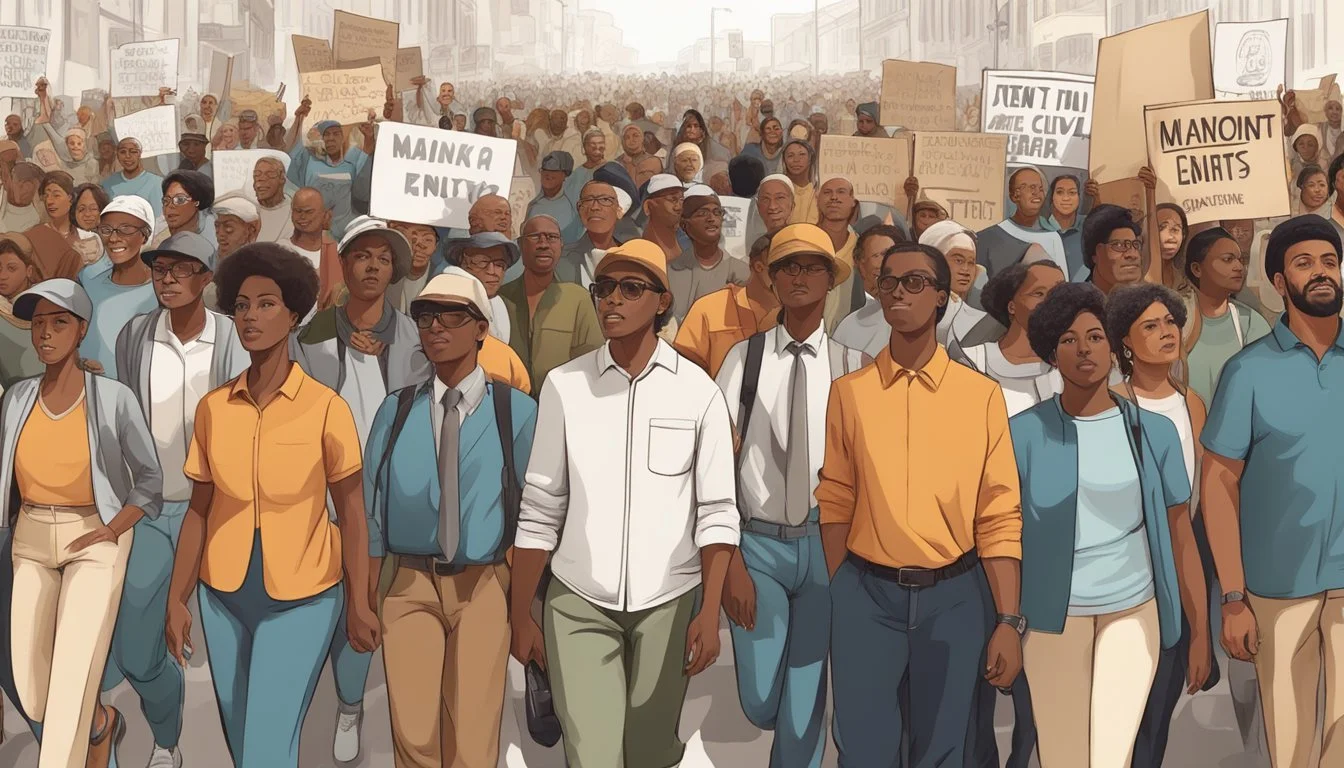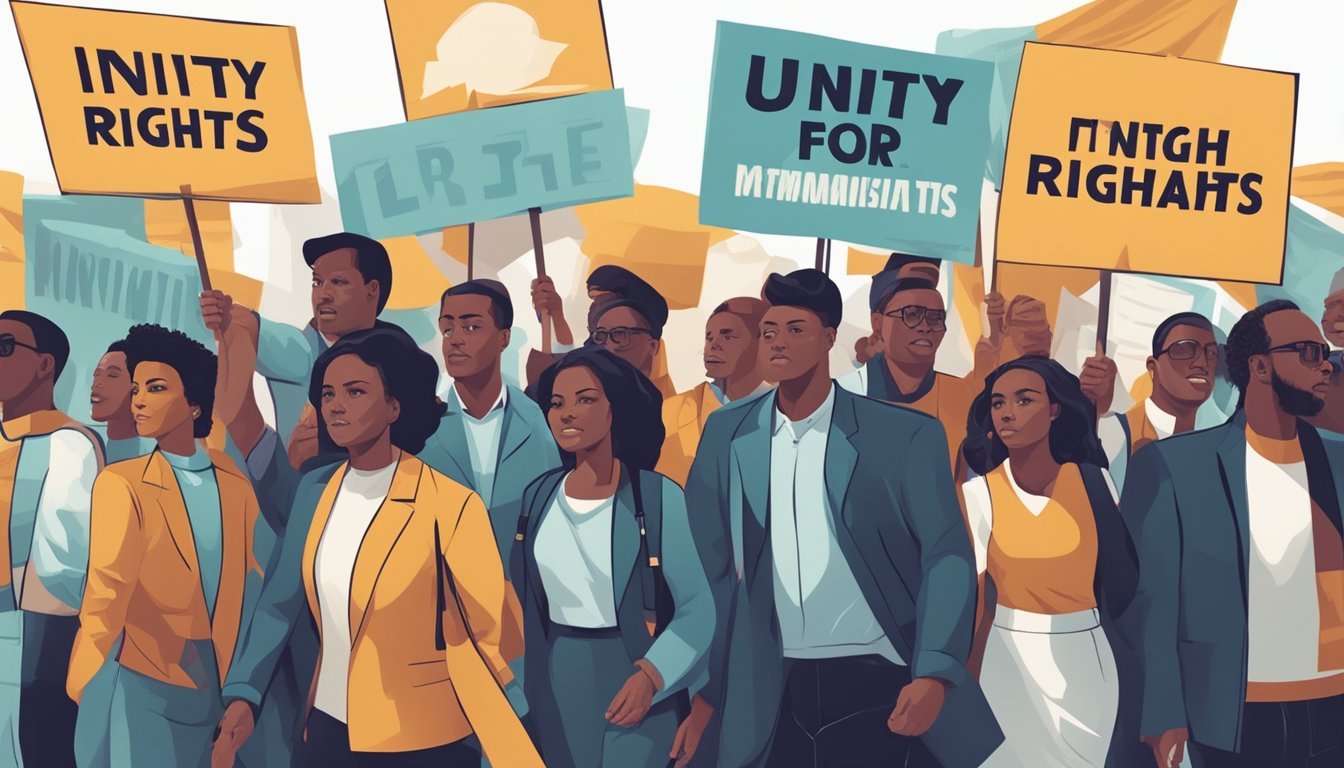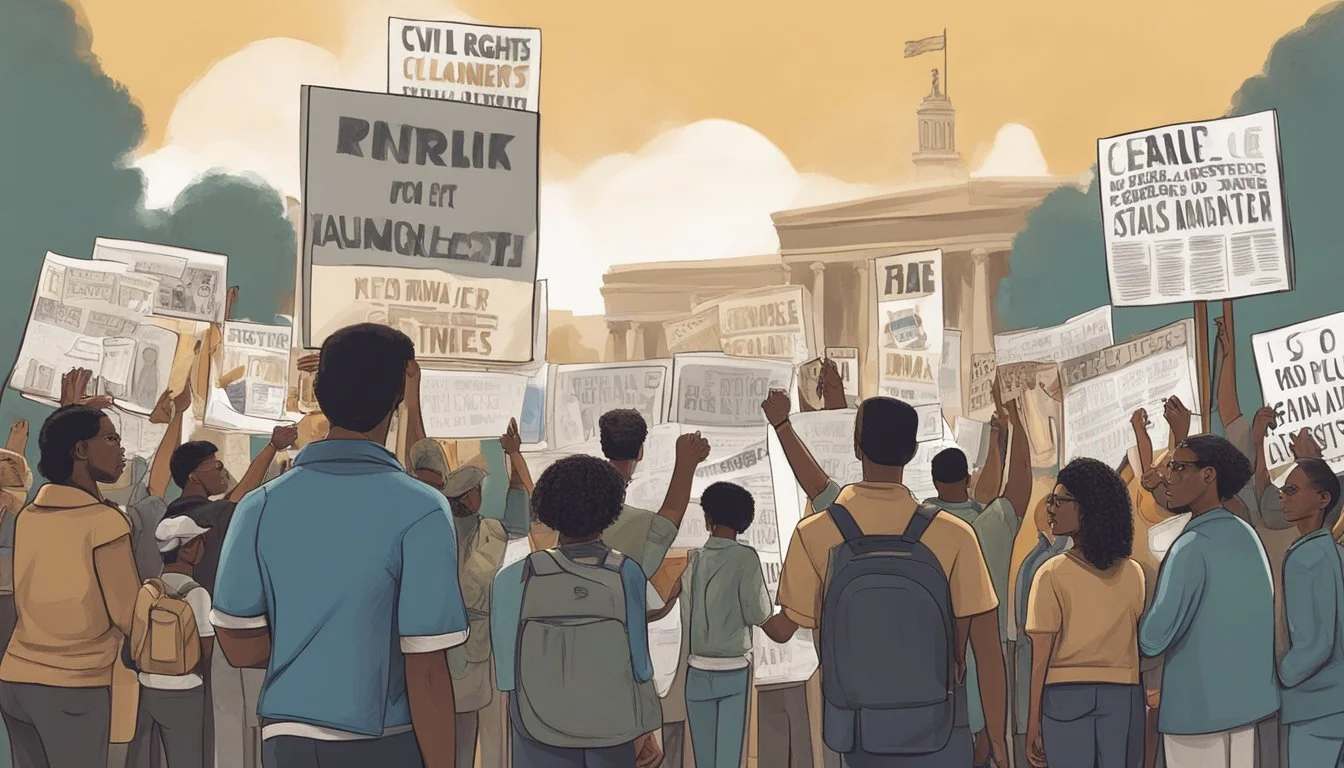9 Documentaries on the History of the Civil Rights Movement
Essential Viewing for Understanding Social Change
Documentaries about the Civil Rights Movement offer viewers a powerful window into a transformative period in American history. These films capture the struggles, triumphs, and pivotal moments that shaped the fight for equality and justice.
By exploring key events, leaders, and everyday heroes, civil rights documentaries provide essential historical context and insights for understanding contemporary social issues. From iconic figures like Martin Luther King Jr. to lesser-known activists, these films bring to life the courage and determination of those who fought against systemic oppression and discrimination.
1) Eyes on the Prize
"Eyes on the Prize" is a landmark documentary series that chronicles the American Civil Rights Movement. Created by Henry Hampton, this 14-hour television series covers major events from 1954 to 1985.
The documentary begins with the Montgomery bus boycott and continues through the Voting Rights Act of 1965. It also explores the rise of Black Power and the challenges faced by the movement in the 1970s and 1980s.
"Eyes on the Prize" features interviews with key figures and ordinary people who participated in the struggle for civil rights. The series uses archival footage and photographs to bring historical events to life.
Originally aired on PBS, the documentary received critical acclaim and numerous awards. It is widely regarded as one of the most comprehensive and influential examinations of the Civil Rights Movement.
The series is divided into two parts, with the first six episodes covering 1954-1965 and the remaining eight episodes focusing on 1965-1985. "Eyes on the Prize" continues to be used as an educational resource in schools and universities.
2) Freedom Riders
"Freedom Riders" is a powerful documentary that chronicles a pivotal chapter in the American Civil Rights Movement. The film, directed by Stanley Nelson, focuses on the events of 1961 when over 400 activists challenged segregation in interstate travel.
These brave individuals, known as Freedom Riders, embarked on bus journeys through the Deep South. Their goal was to test and challenge local laws that enforced racial segregation on public transportation.
The documentary vividly depicts the violence and resistance the Freedom Riders faced. In Anniston, Alabama, an angry mob of about 200 white people surrounded a Greyhound bus carrying the activists.
Nelson's film brings to life the courage and determination of the Freedom Riders. It showcases their willingness to face arrest and violence in pursuit of racial equality.
The documentary incorporates interviews with participants and historical footage. This combination provides viewers with a comprehensive understanding of this significant moment in American history.
"Freedom Riders" serves as an important educational tool. It highlights the sacrifices made by civil rights activists and the impact of their actions on the broader movement for racial justice in America.
3) 13th by Ava DuVernay
Ava DuVernay's documentary "13th" examines the intersection of race, justice, and mass incarceration in the United States. Released in 2016, the film takes its name from the 13th Amendment to the U.S. Constitution, which abolished slavery except as punishment for a crime.
The documentary traces the history of racial inequality from the end of slavery through Jim Crow, the Civil Rights Movement, and into the present day. It argues that mass incarceration serves as a modern form of slavery and racial control.
DuVernay interviews scholars, activists, and politicians to explore how the criminal justice system disproportionately affects African Americans. The film presents statistics and historical footage to support its claims about systemic racism.
"13th" connects current issues of police brutality and for-profit prisons to a long history of exploitation and discrimination. It challenges viewers to consider how past injustices continue to shape American society today.
The documentary received critical acclaim for its powerful storytelling and thought-provoking analysis. It was nominated for numerous awards and helped spark conversations about criminal justice reform.
4) The March by James Blue
"The March" is a significant documentary film directed by James Blue in 1963. It chronicles the historic March on Washington for Jobs and Freedom, a pivotal event in the Civil Rights Movement.
Blue's film captures the preparation, journey, and culmination of this monumental gathering. The documentary follows participants from their hometowns to Washington D.C., providing an intimate look at their experiences and motivations.
The film showcases the march itself, including the iconic "I Have a Dream" speech by Dr. Martin Luther King Jr. Blue's camera work offers viewers a front-row seat to this transformative moment in American history.
Originally produced for international audiences by the United States Information Agency, "The March" was not widely shown domestically due to legal restrictions. In 2008, the Motion Picture Preservation Lab restored the film, ensuring its preservation for future generations.
This restoration allowed for a digital release in 2013, coinciding with the 50th anniversary of the march. The documentary's vivid portrayal of this crucial civil rights event continues to educate and inspire viewers today.
5) I Am Not Your Negro by Raoul Peck
Raoul Peck's documentary "I Am Not Your Negro" offers a powerful exploration of race in America through the words of James Baldwin. The film is based on Baldwin's unfinished manuscript "Remember This House" and features narration by Samuel L. Jackson.
Peck uses archival footage and interviews to bring Baldwin's insights to life. The documentary examines the civil rights movement of the 1960s and draws parallels to contemporary issues of racial inequality.
The film covers Baldwin's reflections on prominent civil rights leaders like Martin Luther King Jr., Malcolm X, and Medgar Evers. It also incorporates Baldwin's personal observations on American history and society.
"I Am Not Your Negro" received critical acclaim and an Oscar nomination for Best Documentary Feature. It has been praised for its nuanced examination of racial dynamics in the United States.
The documentary serves as both a historical record and a commentary on present-day racial issues. It invites viewers to consider the ongoing relevance of Baldwin's perspectives on race in America.
6) King in the Wilderness
"King in the Wilderness" is a powerful documentary that focuses on the final years of Martin Luther King Jr.'s life. The film premiered on HBO in 2018 and was directed by Peter Kunhardt.
This documentary covers the period from 1965 to 1968, shedding light on a tumultuous time in King's life and the civil rights movement. It explores events such as the Chicago Freedom Movement and the James Meredith march.
The film portrays King's unwavering commitment to nonviolence during a time of increasing social unrest. It offers a nuanced look at the challenges he faced, both personally and as a leader.
"King in the Wilderness" provides viewers with a complex and poignant portrait of the civil rights icon. It examines his struggles with self-doubt and the pressures he experienced during this crucial period.
The documentary features insights from those who knew King closely, offering a unique perspective on his final years. It debuted at the 2018 Sundance Film Festival, garnering critical acclaim for its thoughtful portrayal of King's legacy.
7) The Loving Story
"The Loving Story" is a powerful documentary that chronicles the landmark civil rights case Loving v. Virginia. The film focuses on Richard and Mildred Loving, an interracial couple whose marriage was deemed illegal in Virginia in the 1950s.
Directed by Nancy Buirski, the documentary uses a combination of archival footage and contemporary interviews to tell the Lovings' story. It includes newly discovered 16mm footage by Hope Ryden, which provides an intimate look at the couple's life.
The film explores the legal battle that ensued when the Lovings challenged Virginia's anti-miscegenation laws. Their case eventually reached the Supreme Court, resulting in a 1967 decision that legalized interracial marriage across the United States.
"The Loving Story" features interviews with the Lovings' daughter, Peggy, as well as their ACLU lawyers, Bernard S. Cohen and Philip J. Hirschkop. These personal accounts offer valuable insights into the couple's struggle and the wider civil rights movement.
The documentary also incorporates rare photographs by LIFE Magazine photographer Grey Villet, adding visual depth to the narrative. It aired on HBO in 2012, bringing this crucial chapter of civil rights history to a wider audience.
8) Soundtrack for a Revolution
"Soundtrack for a Revolution" is a powerful documentary that explores the American Civil Rights Movement through its iconic music. Released in 2009, the film was directed by Bill Guttentag and Dan Sturman.
The documentary showcases the freedom songs that became anthems of the movement. These songs were sung during protests, marches, and mass meetings, providing inspiration and unity to activists.
"Soundtrack for a Revolution" features performances by contemporary artists like John Legend, Joss Stone, Wyclef Jean, and The Roots. They offer modern interpretations of classic civil rights songs, connecting past struggles to present-day audiences.
The film combines archival footage with interviews of civil rights veterans. This approach provides historical context while highlighting the enduring impact of the movement's music.
"Soundtrack for a Revolution" premiered at the Cannes Film Festival and later aired on PBS's American Experience series. It offers viewers a unique perspective on a pivotal period in American history through the lens of its inspiring musical legacy.
9) Selma by Ava DuVernay
"Selma" is a powerful historical drama directed by Ava DuVernay, released in 2014. The film chronicles the 1965 voting rights marches from Selma to Montgomery, Alabama, led by Dr. Martin Luther King Jr. and other civil rights leaders.
DuVernay's film brings to life the heroism of the activists who participated in these pivotal protests. It focuses on the events leading up to and including "Bloody Sunday," when state troopers violently attacked peaceful marchers on the Edmund Pettus Bridge.
The movie offers a unique perspective by telling the civil rights story through Black eyes. It showcases not only the well-known figures of the movement but also highlights the contributions of unsung heroes, including women who played crucial roles.
"Selma" stands out for its portrayal of the strategic planning and personal sacrifices behind the protests. It depicts the challenges faced by organizers as they navigated political obstacles and internal conflicts within the movement.
DuVernay's direction captures the tension and courage of the era, presenting a nuanced view of the civil rights struggle. The film serves as both a historical document and a reminder of the ongoing fight for equality and voting rights.
Significance of the Civil Rights Movement
The Civil Rights Movement fundamentally reshaped American society and continues to influence social justice efforts today. Its impact extended far beyond legal changes, transforming cultural attitudes and inspiring ongoing activism.
Impact on American Society
The Civil Rights Movement led to landmark legislation that dismantled legal segregation. The Civil Rights Act of 1964 prohibited discrimination based on race, color, religion, sex, or national origin. The Voting Rights Act of 1965 outlawed discriminatory voting practices.
These laws opened doors in education, employment, and housing for African Americans and other minorities. Schools began to integrate, and workplace discrimination became illegal.
The movement also sparked changes in social norms and cultural attitudes. It challenged deeply ingrained prejudices and promoted greater acceptance of racial diversity in American society.
Legacy in Modern Times
The Civil Rights Movement's legacy continues to shape contemporary social justice efforts. Its nonviolent protest tactics have inspired movements worldwide, from anti-apartheid struggles to LGBTQ+ rights campaigns.
Many civil rights organizations founded during this era remain active today, addressing ongoing issues of racial inequality. The movement's emphasis on grassroots organizing and coalition-building still informs modern activism.
Civil rights history has become an integral part of American education, ensuring new generations understand its significance. Museums and memorials dedicated to the movement help preserve its memory and teach its lessons.
Today's Black Lives Matter movement and efforts to address systemic racism draw inspiration from civil rights era strategies and goals.
Key Figures and Leaders
The Civil Rights Movement was shaped by courageous individuals who fought tirelessly for equality and justice. These leaders came from diverse backgrounds and employed various strategies to advance the cause of civil rights.
Influential Activists
Rosa Parks ignited the Montgomery Bus Boycott in 1955 by refusing to give up her bus seat to a white passenger. Her act of defiance became a catalyst for change. Martin Luther King Jr. emerged as a prominent voice, advocating for nonviolent resistance and delivering his iconic "I Have a Dream" speech in 1963.
Malcolm X, a powerful orator, championed Black empowerment and self-defense. Fannie Lou Hamer fought for voting rights in Mississippi, enduring violence and intimidation. John Lewis, a Freedom Rider and later congressman, played a crucial role in organizing the 1963 March on Washington.
Political and Social Leaders
Thurgood Marshall, as an NAACP lawyer, successfully argued Brown v. Board of Education before the Supreme Court, leading to school desegregation. He later became the first Black Supreme Court Justice.
President Lyndon B. Johnson signed landmark civil rights legislation, including the Civil Rights Act of 1964 and the Voting Rights Act of 1965. Roy Wilkins, executive director of the NAACP, worked tirelessly to advance civil rights through legal and political channels.
Ella Baker, a grassroots organizer, mentored young activists and co-founded the Student Nonviolent Coordinating Committee (SNCC). Her behind-the-scenes work was instrumental in shaping the movement's direction and developing future leaders.





